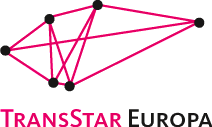Local Meeting of the Ukrainian-German Group, 2–4 December 2013 in Berlin
We finally had the chance for all of us to meet because Constanze was unable to make it to our first meeting in Kyiv in April 2013. This time we spent three days at Sofia’s home in Berlin, surrounded by books, cookies, chocolate, coffee, and news updates about the Euromaidan protests during every break.
Claudia sent us our working program in advance, so we all knew what to expect and what we would be working on. There was enough time scheduled for each of us. We worked on Stefan’s translation of Marianna Kiyanovska’s novel Hra u zhyve i mertve (The Game of the Living and Dead) and asked ourselves, for instance, how to translate the very specific short nickname that the protagonist uses for her grandfather: eventually, Di became Did. The rhythm of this lyrical text was not easy for us to maintain at first.
Afterwards it was Nina’s turn. She had prepared three short texts by Myroslav Dochynets. We tried to determine how to translate the spoken language the right way, in order to make the personality of the character clear. Claudia gave us some hints on how to retain the dialect coloring in the text, using one of Dochynets’ stories as an example. Constanze had also prepared some short stories for our meeting. She chose three texts from Dzvinka Matiyash’s book Istoriyi pro troyandy, doshch i sil′ (Stories of Roses, Rain, and Salt). They gave us the chance to practice creating a child’s perspective and how to strike the right note in a text. An important aspect here was also the proper use of German tenses. A specific problem that we encountered in several of our texts was the perception of social hierarchies and intimacy, which are visible in the way the characters are addressed.
Last but not least, we dealt with Sofiya’s translation of Lina Kostenko’s Zapysky ukrayins′koho samashedshoho (Notes of a Ukrainian Lunatic). How many additional explanations are needed and useful for understanding the cultural context of a text, and what kinds of explanations should one use? Is it better to embellish the text, or to add a glossary or an afterword at the end? We chose the first alternative. Another problem we faced in Sofiya’s translation was the use of political jargon.
Together we were able to find many good solutions and we stocked up on new motivation for the next translations at home. We are also looking forward very much to meeting in Krakow in January 2014!
Some photos are available here.


